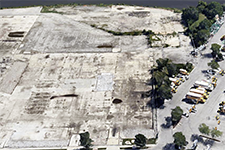A dramatic shift has occurred in the first stage of Lincoln Yards' construction.
The change shows how much latitude the project's developer, Sterling Bay, has had to reshape its massive plans—shutting out public input in the process, some neighbors argue.
Sterling Bay presented the first construction planned in its sprawling Lincoln Yards campus to the Chicago Plan Commission during a public hearing on April 15.
Lincoln Yards' proposed 14.5 million square feet of residences, offices, and retail would straddle the Chicago River's North Branch around Cortland Street.
The plan presented on April 15 would put a single, nine-story building on vacant land at 1201-1299 W. Concord Place on the west bank of the Chicago River. The plan includes a riverside overlook, with a river walkway that could extend north and south to a future bicycle/pedestrian path.
Sterling Bay indicated that its new site would have laboratory and office space designed for tenants drawn from Chicago's growing biotech industry, or what Sterling Bay calls "life sciences."
Changing plans
When the city approved Sterling Bay’s application to rezone 54 acres of vacant land for Lincoln Yards in March 2019, Sterling Bay had submitted a "Phase 1" plan to construct several buildings at the development's northwest corner—in a section called Lincoln Yards North—that would combine office and retail uses.
But last August, Sterling Bay nixed the original Phase 1 plan in favor of the single Concord Place building in the section called Lincoln Yards South.
Contrasting with the developer's original plan—which was subjected to lengthy public scrutiny, leading to city approval—the revised plan surfaced a year-and-a-half later without any visible public process.
When asked what led to the shift in plans, a Sterling Bay spokeswoman said via e-mail, "Throughout the Lincoln Yards approval process, Sterling Bay stated that it would build where market demand supports construction."
"We feel," the spokeswoman said, "our new life sciences development is most appealing to the current market."
Article continues below:
Available only to subscribers. Subscribe here for unlimited access. Subscribers: log in.
A version of this piece appeared originally in The Daily Line.






